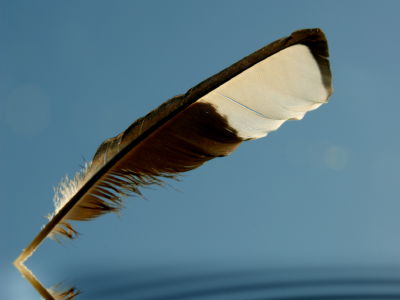Why were birds able to survive despite the asteroid impact at the end of the Cretaceous period that wiped out the dinosaurs?

Dinosaurs, which once existed in large numbers on Earth, are thought to have become extinct due to the impact of a meteorite about 65.7 million years ago. However, the ancestors of birds such as pigeons and penguins survived the mass extinction at the end of the Cretaceous period. The scientific media Smithonian Magazine explains why birds are still thriving today while dinosaurs such as Tyrannosaurus and Stegosaurus became extinct.
Why Birds Survived, and Dinosaurs Went Extinct, After an Asteroid Hit Earth | Science| Smithsonian Magazine

The ancestors of birds are thought to have appeared in the Jurassic period about 150 million years ago. The birds at that time are thought to have evolved from a small, feathered, raptor-like dinosaur called Archaeopteryx. After that, over the course of 80 million years, they evolved into birds like the shoebill, which swims with teeth, and birds with large beaks.
However, 66 million years ago, an asteroid struck what is now the Yucatan Peninsula, sending debris raining down and causing forest fires. The sky was then covered in soot and ash, and temperatures plummeted. As a result, more than 75% of the species that existed 66 million years ago are believed to have become extinct.
On the other hand, birds survived this disaster and have continued to thrive in the Cenozoic Era since the Cretaceous Period. 'There's been a lot of debate about why only modern birds with beaks were able to survive while non-avian dinosaurs and pterosaurs became extinct,' said Derek Larson, a paleontologist at the Royal BC Museum.

As mentioned above, many of the birds that survived the mass extinction were species with toothless beaks. Some birds are believed to have disappeared due to the degeneration of their teeth during the evolution from Archaeopteryx. These birds ate by plucking food with their beaks.
'It was previously thought that teeth were used to reduce weight during flight, but it has now been shown that some toothed birds were also powerful fliers, which overturns this hypothesis,' said Grace Musser, a paleontologist at the University of Texas at Austin.
The modern hypothesis is that as birds became more herbivorous, they evolved beaks, which resulted in the loss of teeth. The earliest birds had teeth for eating insects and other small animals, but then birds that pecked at fruit and seeds evolved. By the end of the Cretaceous, toothless birds were able to eat a much more diverse diet than their toothed counterparts.
During the mass extinction at the end of the Cretaceous period, environmental changes caused a sudden decline in the number of foods available for consumption. As a result, many animals became extinct, but toothless birds, which could eat a wide variety of foods, were able to obtain sufficient food.
On the other hand, species like
Previous research has revealed that birds related to ducks, parrots, and chickens were already present at the time of the mass extinction. Some of these species also became extinct when the asteroid struck, but the surviving species contributed to subsequent evolution.

Furthermore, subsequent evolution has led to a decrease in body length while keeping the brain size the same, resulting in larger brains relative to the size of the body, which has led to improved intelligence in birds.
However, it has also been pointed out that birds have evolved too quickly. Ryan Felice, an anatomist at University College London, pointed out, 'Herbivorous mammals and non-avian dinosaurs evolved to keep growing teeth so they could continue eating even if their teeth wore down. But beaks don't grow back. If birds lost their teeth during the evolutionary process, the variety of food they could prey on would rapidly decrease.'
Related Posts:







